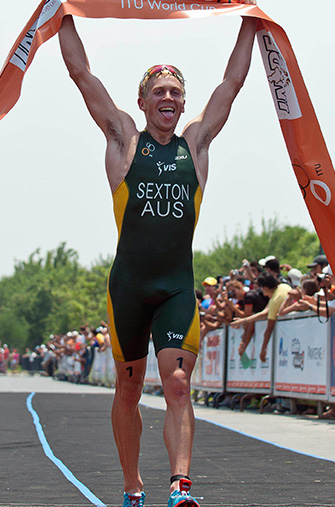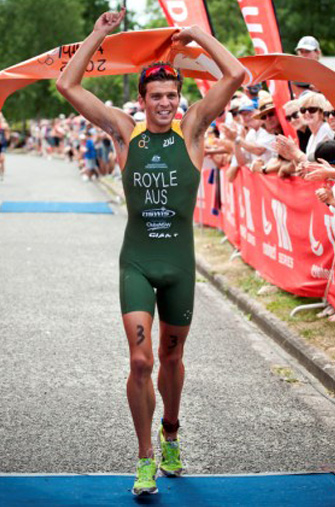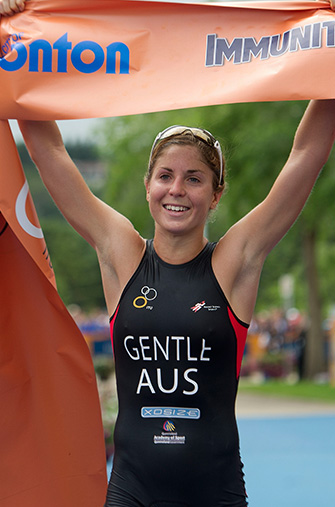Emma Snowsill – Recharging the engine
Phil Wrochna
From standing on top of the Beijing podium with a gold medal around her neck, to being the unlucky woman who missed out on a ticket to London, Emma Snowsill has seen it all. Firstoffthebike.com sat down with ‘Snowy’ last week to find out how she is progressing in her return to competition, and get some insight into where she sees women in elite triathlon.
The dust has settled after the London Olympics. Where are you now in terms of your racing and how was it standing there in London taking a look at it?
Yeah as far as after London, like you said, the dust is settling. I think the first decision, regardless of the outcome of London and everything in the process that went on, is that I wanted to step away from ITU racing and I wanted a break, or a change from that. So, that’s definitely not on the cards. In terms of racing, it’s more the non-drafting, Olympic-distance and try out [an Ironman] 70.3. But, to be honest, first and foremost is getting back to being healthy enough to put all those plans in motion.
I think over the last year, I’ve sort of got away with it a lot in a sense. When you push your body and you’re always at the extreme on that knife’s edge, I think your body at some point says enough and that’s really where I found myself. It was a combination of a lot of the things that have just compounded on top of having a pretty serious virus at the end of the season, which meant I couldn’t be doing anything for a couple of months. I got a seriously severe parasite, and on top of that, slowly my health couldn’t keep up with the extra fighting. I think after not making the team it was a combination of the stress I’d put myself through, but I just felt like I needed some time out. My body saying enough was enough. I was constantly getting colds where I knew it wasn’t normal and I just knew that my immune system had really taken a battering and if I didn’t change and do something about it then there was no way I would be able to continue the way I was.

Watching the Olympic games, how was that for you? How were your interactions with some of the people, the TA people etc. while you were at the races?
Actually during the women’s race, I was back out towards the village on top of a shopping centre building doing some Channel 10 work for all the coverage back in Australia and I didn’t get time to get back to the actual site. I watched it all on TV, and look, athletically it’s the hardest thing that I’ve ever sort of put myself through. I think, even now, it does affect your guts, you know get that feeling where you wish you were there, you wish things were different and would’ve loved to have been competing.
I thrive on competing for my country. I thrive on competing at the top level. It’s different when you are in the ball game and you’re there [competing] and if something happens then sobeit. But when you’re not there, when you don’t have the chance, it’s really hard. It’s really hard to come to terms with, but in the same breath, I had to look at what I’ve had, the experience I had in Beijing and I had to take away from the fact that, well, if I only got to go once then I made the most of it. That’s all part of reasoning. I found another reason to be there and to broaden my horizon in the sport. But I did manage to get out to the men’s race and it’s an atmosphere and a feeling that I’m probably glad I didn’t go out there for the women’s because it was incredible. I mean, there’s no denying that being at an Olympics is just something special. It’s a feeling which, like I said, probably was good. I did enjoy it for a bit, but it was a feeling that I love. I loved being there and the men’s race obviously was phenomenal to watch, but I think going back to the whole Olympics and obviously not being a competitor there and my experience shortly after the men’s race really reiterated to me some of the biggest problems we have in terms of not just the fact that I missed out, but the unanswered questions. In particular, why, and the process in which it occurred, and I think that was probably what was actually more saddening for me.
You know, frustration obviously comes into it, but I think my thought process from there on in was this just shouldn’t happen this way. Athletes do well with clear cut. You know, they can reason with themselves if it’s something like a mechanical issue or something that they didn’t do on the day. I think for me that was something that I felt really upset by. The more questions I seemed to ask, the more greyer it seemed to get and there’s obviously many, many people involved in not only the process of high performance and selecting a team, but within our sport, and I think if you’re dealing with elite athletes you really need to know how to deal with them. And I understand, there’s plenty of people in those jobs that are very good at what they do, and they run an organisation, which is something I’m not interested in doing and have no idea about. But if they want to feel a part of an elite athlete reaching for the pinnacle of their sport, I just really think they’ve got to be more involved if they choose to be in that process. You know, obviously age group [racing] is what makes our sport, but at the other end of the spectrum, you also need to have an understanding of when it comes to Olympic selection, the [Olympic] processes and how best to deal with athletes and where they’ve come from, what they’ve done, sometimes it can come across as maybe not all that diplomatic.
Would you be happy with a one or two race selection criteria where basically you are given two dates to show up to and if you do your best and get the results you go straight into an Olympic team? Would you be onboard with that, yes or no?
Yes, definitely. It’s something that, as athletes, racing is pressure. When you want to perform you put a pressure on yourself and given Olympic selection, sure that’s another pressure, but to race in an Olympics is another pressure again. If you’re not able and prepared to handle that pressure, then it’s something you need to look at to work upon and I think, like I said, it gives you reasoning as an athlete.
If you stuff up on the day, you walk away and you go, you know what, I didn’t get it right. Sure, you’re going to beat yourself up for a bit. You’re going to be upset and feel all the normal things, but you walk away and say, well, it was down to me, and you can change that. When it’s not, it’s just more questions, it’s more grey. I don’t really see how any other young and up-and-coming athlete looks at it and doesn’t say, “what do I really have to do?” It’s all about setting goals and putting the process in place, that’s what athletes work off, and, like I said, everybody takes a step back, everybody learns. Unfortunately, at times, there are probably more lows than highs in that respect, but you get to understand that about yourself and how you work through that, and as an athlete, you can walk away from that a lot, lot better than these constant grey areas.

Moving away from the Olympic and the selection criteria, etc., I want to talk to you about the business of triathlon because you’re someone who has been at the top end. You’ve done the TV commercials; you’ve been on billboards; you’ve been a poster girl for both your sport and for your sponsors. First, in your experience, how tough, as a woman, is it to go and get yourself sponsored to a point where you are full-time and you make a living out of it?
I think there are two aspects in my experience. [The first] is one that you’re dealing with Australia in an Olympic sport, which when you get to be involved [with an Olympics] you are privy to seeing other Olympians and what differentiates them in terms of sponsorship – and every sport’s different. I think we’re far better off than I would say what rowers get. But in terms of swimmers, who can win, what, five gold medals, you constantly look at where value is and what value is and I think in terms of a whole, I think I’ve been very fortunate to receive what I have. And to be able to also promote the sport, to say look out, our sport is up there.
Our sport is just as big and as great as any other of the Olympic sports, but in terms of within the sport, I think the same. Honestly, it is. It’s a huge market in terms of what exposure you can get, what branding you can get within the sport itself, but I think it’s always going to be a hard one counteracting against males because I honestly I don’t look to compare. I can’t really worry about it because unfortunately I’m worried about my results and I think I’ve always been a fairly big believer in, if I do well and I promote my results, then hopefully then people will continue to support me and in return then I try and work with them as best as I can.
I honestly don’t have a direct correlation between what the top man earns and what the top woman earns because I’m not going to sit and worry about it. I do the sport for what it is and it’s why I love it. I love supporting the people who support me and I’m very thankful for whatever I get from them. I know it has to be different to some degree, I’m sure, but I also believe that it’s totally market-based in the country we live in.
I think being an Australian competing in the US I found a lot of support there. I was actually surprised with how welcoming they were of a foreign athlete and how much they embraced and wanted to take me onboard. I think you have to promote yourself as being a good sportsperson, but being yourself also helps in terms of sponsorship as well. You obviously can’t deliver the world in a sense that you can be here, there and everywhere for them because they want results as well. There are a few markets, I guess, I always look at in terms of how do I see myself, and I think that constantly adjusts and readjusts too, particularly during the time I’ve been in the sport.

For young women who want to turn professional, given the amount of men in triathlon, do you think that’s a turn off or do you think people will overcome and do what they love?
Well, absolutely not. I see the opportunities for young girls and sponsorship at the ages that are probably younger than when I was in even involved in the sport. I think it’s incredible. I think the support is amazing. I think it’s there for the taking. In some respect, I think the younger guys are up against tougher competition. Unfortunately that’s the nature of any sport. The quality of men, I guess, in a smaller pool is it’s always going to be greater. It’s human nature. It’s the way [our] bodies are built, and I think for the girls, there are so many more women-specific, not just products, but also in terms of women-specific campaigns and advertising for bikes. The fact that bikes are now being designed for women. That’s something where women can corner part of the market and utilise it for their own benefit in racing, and also for their own return in sponsorship. I definitely don’t see that it’s harder by any means.
So where do you see the direction of women in triathlon? Do you think it’s in good shape or does it need more stronger characters like yourself or Chrissie Wellington, who was always so vocal with everything she did and at every race she went to? Where’s the direction for you overall and I guess even more specifically the ITU world given that that’s where you’ve just recently come from?
I probably can’t talk so much on an international level, I know more from my experience on an Australian level. It’s a tricky one. I was thinking about it the other day. I really feel like I’ve almost been in three generations of my sport in the sense that I’ve really came out of an amazing era of women’s triathlon in Australia with Michellie Jones, Loretta Harrop and Nikki Hacket. Trying to make an Australian worlds team of six girls was ridiculous, like it was a catfight. Looking where we are now, sometimes I think, well, what’s happening? Not what’s gone wrong but what’s not happening.
Personally, I don’t know very many of the junior girls. I don’t really know a lot of our young up-and-comers other than the girls like the Ashleigh Gentle and the Emma Jackson, who have come onto the ITU scene. For me, when I really look back to where I was at that age, the biggest gap I see is how do the younger girls learn when they’ve got no-one else there around them to look up to. I mean that in a sense of, there are not really any opportunities where they get to be around and train [with older athletes], and I think the best way to learn is to observe and to be in an environment where the best of the best are there and you are trying to emulate them.
I remember by first ever World Cup and my coach at the time, Bill Davoren, said this is Michellie Jones. You follow her, you shadow her, you watch everything she does in this race and, of course, I was like: Oh my God, no, that’s so scary, that’s just ooh, ooh, ooh.
I think those are the points where young athletes; they need to see what they’re doing. They need to see what it takes. They need to see what’s involved in being the best. I think that probably is one small area that could really be improved with the up-and-coming generation in our sport in Australia, and for females obviously. It’s a tricky one. It is tricky because the type of racing has changed as well in the respect that we have under-23 races and there are big jumps to be made. But I honestly feel that if I wasn’t given the opportunities and experiences to be able to train with Loretta Harrop, Siri Lindley, Lizbeth Kristensen, Annie Emmerson, Bella Comerford and people that were at the top of their game… I was just chasing, chasing, chasing all the time, and I think that was great for me. I think that showed me hunger. Learning and watching what they did and how they prepared in training for races and watching how they raced. I think that was just an invaluable experience that you can’t necessarily just teach.
To the young women who are coming into triathlon not just age groupers, but elites, who are looking to make a living out of it, if you could give them one piece of advice from all of what you know, what would it be?
It’s interesting because I was always of the belief that if you work hard, the results will come, and if the results come the sponsorship will come. I really believe that comes hand-in-hand and I think it’s one thing to work on sponsorship, but you also need to be able to show your credentials as well. So it’s one thing to be out there and marketing yourself, but you can’t let that detract from training, and I think as you progress and you get more results, that’s when you start looking at how do I balance what I now have and how do I improve myself with sponsorship and in the market of triathlon as a female athlete. Realistically, I would look at it and go: work out what your dreams and goals are within the sport and chase after them first because everything else will follow.



